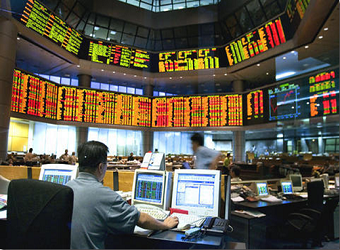Asian equities were mostly lower in Tuesday trade, following a lower close on Wall Street as geopolitical tensions continued to weigh.
South Korea’s Kospi fell by 0.58 percent. Concerns over geopolitical tensions continue to build on the Korean Peninsula after the U.S. deployed a carrier strike group closer to the region, and as joint U.S.-Korea military drills continue till the end of the month.
“Here is new focus on Korea, where the Korean won and Kospi have found sellers easy to come by of late on concern that North Korea could be a future U.S. target,” said Chris Weston, chief market strategist at IG, in a Tuesday note.
Japan’s Nikkei 225 declined 0.55 percent after the dollar/yen slipped below the 111.00 handle.
In corporate news, Foxconn has offered a $27 billion bid for Toshiba’s memory chip unit, the Wall Street Journal reported.
Toshiba put its NAND flash memory unit up for sale last month in a bid to cover billions in losses from its U.S. nuclear energy unit Westinghouse.
The Japanese conglomerate may file twice-delayed earnings later in the day even if auditors do not sign off, Reuters reported.
Toshiba shares dropped by 2.05 percent following the news, having plunged 17.2 percent year-to-date.
Sharp shares were also in the red, selling off by 10.4 percent.
Dow Jones reported that market talk suggests Sharp may lose the race to develop the next-generation OLED screen for smartphones to South Korea’s LG, citing Masayuki Kubota, chief strategist at online brokerage Rakuten Securities in Tokyo.
Taiwanese semiconductor manufacturer Foxconn acquired Sharp last year.
Mainland Chinese markets were marginally lower, with the Shanghai Composite down 0.46 percent and the Shenzhen Composite falling 0.581 percent.
The Hang Seng Index was lower by 0.81 percent.
Earlier in the day, Guotai Junan Securities, the third-largest brokerage in China, debuted on the Hong Kong Exchange at a fixed price of HK$15.84 per stock. The IPO raised HK$16.5 billion ($2.12 billion).
Meanwhile, Australia’s benchmark ASX 200 index was the sole bright spot in a sea of red. It reversed earlier losses of 0.08 percent to bounce 0.39 percent.
The National Australia Bank reported its measure of business confidence came in at +6 in March, a dip from +7 the previous month.
On the energy front, both Brent crude and U.S. crude prices reached five-week highs earlier in the session. Brent rose by 0.13 percent to trade at $56.05 a barrel while U.S. crude was higher by 0.02 percent at $53.09.
In currency news, the dollar traded at 101.020 against a basket of currencies at 11:40 am HK/SIN time, off the 3-week high set yesterday.
Likewise, the dollar/yen traded lower at 110.65 compared to levels around 111 seen yesterday while the Aussie was lower at $0.7498, slipping below the $0.75 handle it traded at earlier in the session.
Against the greenback, the won was close to a one-month low at 1,148.830.
The dollar struggled due to “rising geopolitical tensions and uninspiring comments from Fed Chair Janet Yellen,” said BK Asset Management’s managing director of FX strategy Kathy Lien in a note, adding that the dollar will next focus on Friday retail sales reports.
Yellen said overnight that plans to raise U.S. interest rates gradually are aimed at sustaining full employment and near two percent-inflation without letting the economy overheat.
“I think we have a healthy economy now,” Yellen said at an event at the University of Michigan’s Ford School of Public Policy in Ann Arbor.
Yellen repeated earlier comments that the economy is expected to continue to grow at a moderate pace.
“Whereas before we had our foot pressed down on the gas pedal trying to give the economy all the oomph we possibly could, now allowing the economy to kind of coast and remain on an even keel- to give it some gas but not so much that we are pressing down hard on the accelerator- that’s a better stance of monetary policy,” she said. “We want to be ahead of the curve and not behind it.”
U.S. equities closed marginally higher, with the S&P 500 gaining 0.07 percent to finish at 2,357.16 and the Nasdaq higher by 0.05 percent to end at 5,880.93. The Dow Jones industrial average was effectively flat, trading higher by 0.01 percent to close at 20,658.02.
Source: CNBC


